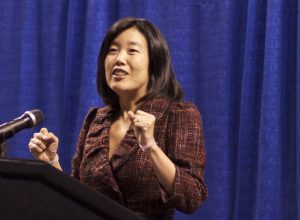When one hears “reform,” it is not uncommon to think policy or personnel changes. Rarely does one have the thought of culture come to mind. For Michelle Rhee, the aspiration to change the culture of public education is exactly what she thinks when she talks reform.
Rhee was not the only one with change on her mind. The members of the Great Issues Committee were forced to change venues when a power outage resulted in the closure of many campus buildings, including the Busch Student Center where Rhee was originally scheduled to present. Chaifetz Arena was eventually determined to be the best option for the Wednesday, March 23 event.
Janelle Densberger, coordinator of student activities and GIC advisor, said the venue change to Chaiftez was made after other campus options were considered, including St. Francis Xavier College Church as events had been held there before; however the church was also out of power. In the end Densberger said Chaifetz was the best option, and she was pleased with how smooth the change went.
Rhee spoke to the crowd of 750 as part of GIC’s Education Week. Luke Gatta, vice president of the committee, said Rhee was brought to campus because of her “strong impact on education.”
“Education is often an issue that, perhaps because it is less polarizing than many other national issues, often goes unnoticed,” Gatta said. “The disparity in education is undeniably segregated by socioeconomic factors, and Rhee is considered a national figure in addressing this important issue.”
The focus of Rhee’s speech was the future of public education and how the system can be changed, how it can be reformed.
“It’s not the kids, but it’s the culture we are creating for our educators,” Rhee said in her speech. “The teachers can make all the difference for our students.”
This statement is an adequate summarization of Rhee’s philosophy: Change the educators and change in the education will follow shortly. Rhee said there are currently two main problems with the public education system, which need to be addressed in order to change the culture, a lack of accountability and decisions made based on politics.
Only when actions are taken to amend these problems will the widespread issues in public education be alleviated said Rhee.
Rhee practiced this philosophy of changing culture and addressing the problems of lack of accountability and political interception when she served as Chancellor of the District of Columbia’s public school system. It was during her time as chancellor that Rhee made a name for herself.
Upon entering the school system, there were only eight percent of eighth graders on grade level, said Rhee. Shortly after making some major changes, including the termination of many of the district’s employees, the measures of success for those students in the D.C. school system grew exponentially.
Rhee does not credit the changes to new policies or a new administration, while they did occur, but to the institution of new, hard-working, dedicated teachers.
“If we’re just doing our job as adults, the children will be able to achieve,” Rhee said in an interview after her speech.
In order to find more teachers of such a caliber, the culture of teaching and of the profession needs to change, said Rhee.
“High achievers want to go into an environment where they know if they are a standout they will be recognized and valued for that,” Rhee said.
College of Education and Public Service senior Sarah O’Connor agrees with Rhee’s thoughts.
“I have been in plenty of schools where there are high quality teachers that leave as soon as possible because the school climate isn’t conducive to student learning,” O’Connor said. “If I wasn’t comfortable with my school culture, it would be hard to stay no matter how much I loved my kids.”
O’Connor is studying early childhood education and is student teaching in kindergarten this semester.
Fellow education major, sophomore Kaylee Krueger, was also in support of Rhee and her ambitions to change the education system.
“I believe what she’s doing with the school districts and schools, in general, is something that has been long needed,” Krueger said. “When a problem arises in the field of education, it seems to be put off or something is done to cover it up. [Rhee] is taking a whole new angle on it, and I think it’ll better the education system, it may just take some time.”










